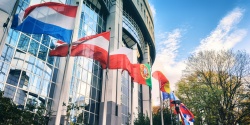Published: 26.02.2019

The European Parliament adopted its annual resolution on the situation of fundamental rights in the European Union in 2017. This document, as well as the previous report on human rights and democracy in the world in 2017 and the EU policy on the matter, demonstrates that the European Union promotes the LGBT ideology and pushes for the legalisation of prenatal killings in the Member States more aggressively that before.
This year's resolution by the European Parliament pays particular attention to the situation of women. The European Parliament stated that the alleged inequality between European women is related with, among other things, the lack of "equal right to abortion due to divergent policies and laws being in force in various Member States". It was then concluded that 'the refusal to provide sexual and reproductive health services and related rights, including safe and legal abortion, constitutes a form of violence against women and girls'. In addition, the Member States were called 'to ensure comprehensive sexual education and prompt access for women to family planning and to a full range of sexual and reproductive health services, including modern methods of contraception, and to safe and legal abortion'.
The provisions of the EP resolution are contrary to the Polish legal order. In particular, they violate the principle of protection of life, which applies to all people from the moment of conception and is expressed in the Constitution of the Republic of Poland. The resolution also opposes the constitutional right of parents to bring up their children in accordance with their own convictions. Furthermore, its provisions are incompatible with international law binding on Poland - the Convention for the Protection of Human Rights and Fundamental Freedoms, the Charter of Fundamental Rights of the European Union, the International Covenant on Civil and Political Rights and the Convention on the Rights of the Child.
The European Parliament strongly condemned the "promotion and practice" of the treatment of unwanted sexual tendencies and encouraged Member States "to criminalise such practices". These provisions are contrary to the constitutional right to freedom of expression and the right to health protection. Unequivocal provisions calling for a ban on specific therapies for homosexuals also run against the International Covenant on Economic, Social and Cultural Rights. MEPs also called on the Member States to guarantee for all the right of "gender expression". This provision raises serious concerns from the point of view of the constitutional protection of the identity of marriage.
Previously, in December 2018 , in their report concerning human rights and democracy in the world in 2017 and the European Union's policy in this area, the EP also imposed acceptance of gender ideology and paid particular attention to the promotion of the LGBT circles. In this document, MEPs stressed the need to "develop educational strategies in schools in order to raise awareness among children and provide them with the tools necessary to identify all forms of discrimination".
The offensive to promote the interests of the abortion movement has gained momentum in the European Union in recent months. In the resolution concerning the report on the state of basic rights in EU in 2016, adopted by the European Parliament in March 2018, there are no postulates concerning the legalisation of prenatal killing or propagation of the so-called reproductive rights, including free access to substances provoking early abortion. Women's rights are presented in the context of the fight against violence, human trafficking or wage disparities, resulting in a gender-based pension gap.
The 2016 resolution, however, promotes the demands by the LGBT community and gender ideology, albeit in a much milder form. Among other things, the document calls on the European Commission to present a proposal for full mutual recognition of the legal effects of all civil status records throughout the EU, including legal recognition of sex, marriage and registered partnerships. Subsequently, initiatives banning the treatment of unwanted homosexual tendencies and the recognition of so-called transgenderism as a disorder were endorsed. At the same time, the Member States were called upon to adopt similar measures, as well as to "recognise gender reassignment and ensure access to quick, accessible and transparent procedures for legal gender recognition that are not subject to medical requirements, such as surgery, sterilisation or a positive opinion by a psychiatrist".
"Resolutions were adopted as own-initiative reports. They have no legally binding force, but as so-called soft law acts they form the acquis of the European Union and point the way forward for the European Union. Therefore, they should not be ignored by the governments of the European Union member states, let alone by Polish representatives in the European Parliament". - Magdalena Olek, Deputy Director of the Center for International Law Ordo Iuris, commented.

15.05.2025
• The European Democracy Shield, an instrument designed to guarantee the EU’s resilience against hybrid attacks and external interference, is currently being developed within European Union institutions.

12.05.2025
In a significant development for Poland’s conservative movement, the newly established Stańczyk Club in Warsaw hosted its first Coalition Meeting last Friday. This event marks the introduction of a model of center-right collaboration that has been influential in the United States since the early 1990s.

During Holy Week, when we remembered the martyrdom of Jesus, many Poles heard about the innocent death of 9-month-old Felek (such an altered name was given to him by Gazeta Wyborcza journalists). Potassium chloride – a substance used to carry out death sentences – was injected into the heart of the boy who was due to be born any day.

• Gazeta Wyborcza published an article titled "Ordo Iuris Wants the Constitutional Court to Delete the Premise of Endangering a Woman’s Health. Prof.